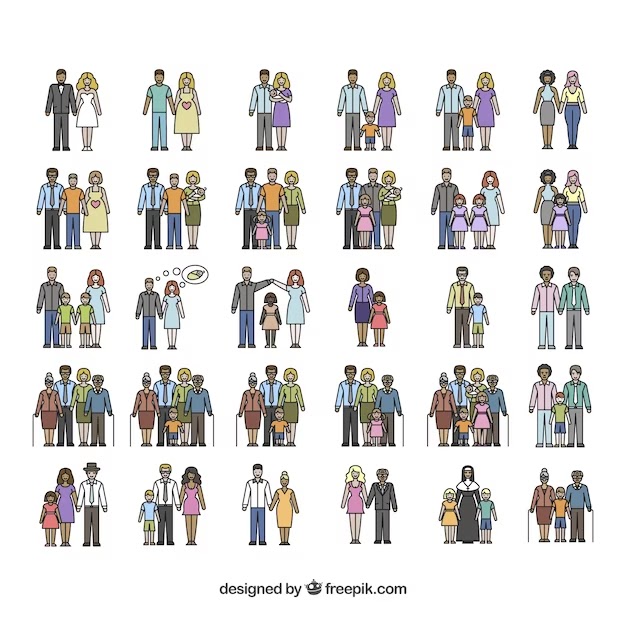What is culture? As defined, culture is the shared aspects of a society's way of life. So, what factors create a culture within the home? There are undeniably thousands of different factors, and thousands of types of families. Unfortunately, I do not have the data nor the resources to go over every type of culture there is, so I will be making a few generalizations.
One of the most influential forces on the culture of a family is social/financial status. The social ladder. On the top we have those who are incredibly well off, wealthy, and who never worry about how much money they'll have for groceries next week. On the bottom rung of the social ladder, we have those who are barely surviving. Who may have enough money to provide a few little meals for themselves, or one good meal for their family. Generally, though, most families fall somewhere in the middle.
Families born and raised in a high standing on the social ladder tend to have a culture where good appearances are important and easy to come by. Some of these families raise children who have a daddy's money lifestyle where a child can have most of the things they desire, whereas some raise children with an emphasis on the importance of building your own success and that money is a privilege. It's like the difference between old and new money. Families created in poverty and the constant worry of if they'll have a roof over their head next month generally creates two types of cultures in a home. One, the view that because I was born/raised in poverty, I will always live in poverty. I can't change my social status, no matter how hard I try because mom and/or dad weren't able to either. Two, I hate living from paycheck to paycheck, and seeing my family struggle- I am determined to work as hard as I can to get us out of this situation. One viewpoint on life creates a culture of gloom and victimization, the other creates one of determination and hard work. Families that sit in the middle of the ladder can have all sorts of combinations of these cultures. For instance, a family in the middle class could prioritize good appearances, but might not be able to afford the nicest clothes for their younger children, so they will buy nicer clothing for their older kids, and then allow the younger children to have nicer hand-me-downs.
Other things, such as where you live (city vs. countryside), what you eat at home (healthier foods vs. junk food), whether you have one or two parents or if your parents are straight of part of the LGBTQ+ community can all affect the type of culture in your home. Some children born into a single parent household are likely to grow up feeling like a social pariah, and are scientifically proven to be more likely to have children outside of the bonds of marriage- because having both parents in a household is not that big of a deal to them.
There are SO many things that affect our family culture. It's overwhelming. So how do we make sure that we build a family culture that we would be proud of, and that our younger selves would be proud of?
It's simple- well, sort of- we need to pick and choose what traditions and behaviors we will implement in our homes, and which ones we will make sure never make it into our homes. Let me give an example. I know that in my future home, faith will be one of the biggest values. I am going to raise my family to believe in God, and Jesus Christ. I am going to raise them to be prayerful. This is a value that I learned from my mom, that is very dear to my heart. I want anyone who enters my home to feel the spirit. On the other hand, one tradition/behavior I definitely will not bring into my future home that was often in home as a child is constant defensiveness and "because I'm the parent" attitude. Growing up, I often felt that I had to defend my actions and beliefs at home. For instance, if I did a sloppy job at loading the dishwasher, I would often get very loud and denigrating words from my father, and then BAM! the walls went up and I immediately started getting defensive. I felt that if I didn't do something perfectly, I'd best be ready to get defensive and debate my cause in a heated argument. Because of that, I grew up very quickly. I had to often act like an adult as a child- which is another thing I will not allow to happen in my future home. I never want my children to feel that they need to put up walls or defend themselves when talking to me. If my children need correction or reprimands, I will do so in a way that invites healthy progress, not spiteful obedience.
To be honest, I know that my future family and home will be very different from the one I grew up in. The home I grew up in has crumbled, and my family is a little broken. But I am so grateful for the lessons I've learned. Because of what I experienced as a child, I hope that I will be able to cultivate a future home and family that doesn't remind me of my bad childhood memories. That's not to say I didn't have a happy childhood at times- I had many beautiful, love-filled, imaginative, silly moments. But I know that the good and the bad are pretty equal in terms of childhood memories. For my children, I want to make sure that the happy memories exponentially outweigh the bad.

Comments
Post a Comment